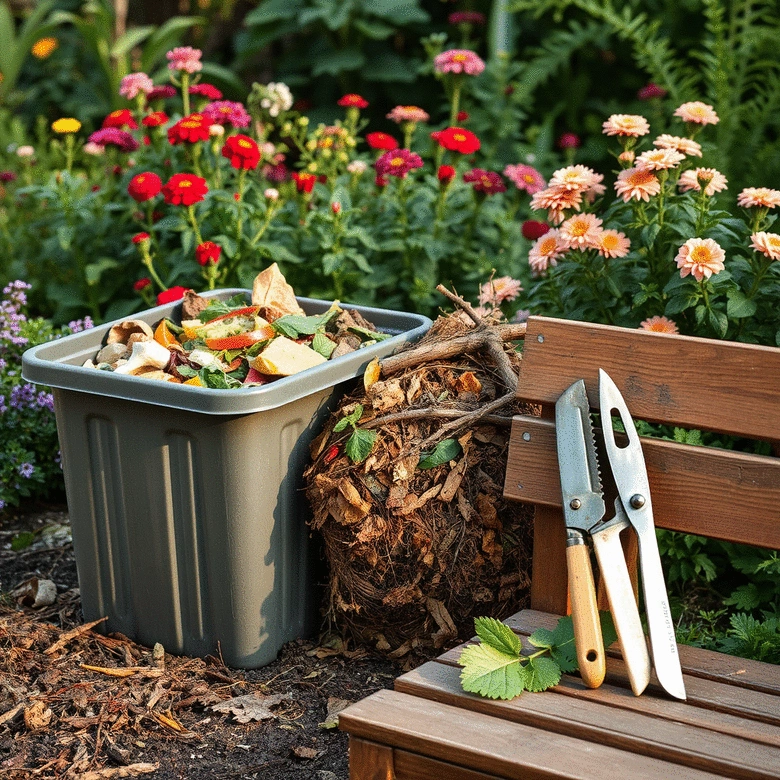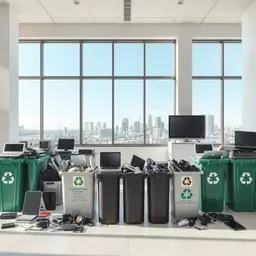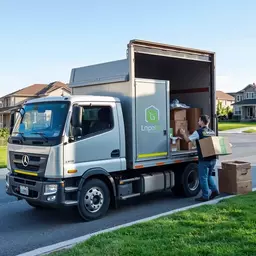Effective Garden Waste Recycling Tips
What if every piece of garden waste you throw away could be transformed into something beneficial for your garden? Understanding the importance of recycling garden waste is not just about keeping your yard clean; it's about fostering a sustainable environment. Here's what you need to know!
What You Will Learn
- Recycling garden waste significantly reduces landfill usage and greenhouse gas emissions.
- Composting enriches soil quality, improves plant health, and encourages biodiversity.
- Effective management of garden waste can lead to cost savings on fertilizers and soil amendments.
- Identifying different types of garden waste is essential for proper recycling practices.
- Implementing zero-waste gardening techniques can prevent waste buildup and promote sustainability.
- Participating in community gardening initiatives fosters knowledge-sharing and inspires sustainable practices.
Impact of Recycling Garden Waste
Recycling garden waste can significantly benefit the environment in multiple ways. Below are key statistics and comparisons illustrating these benefits.
Reduces Landfill Usage
By recycling, we lessen landfill waste by approximately 30%.
Decreases Greenhouse Gas Emissions
Composting reduces harmful methane emissions from decomposing waste by about 50%.
Conserves Natural Resources
Recycling creates nutrient-rich compost, reducing the need for chemical fertilizers by 20%.
Improves Soil Quality
Composting can enhance soil quality by returning valuable nutrients, benefiting plant growth by up to 40%.
Understanding the Importance of Recycling Garden Waste
Have you ever thought about what happens to your garden waste? It's a question that's often overlooked, but recycling garden waste is crucial for our environment. At Sydney Junk Pros, we believe that every little bit counts! Not only does recycling help reduce landfill waste, but it also supports sustainable practices that can benefit your garden and the community.
When we recycle garden waste, it can transform into valuable resources such as compost and mulch. This process not only keeps our environment cleaner but also enriches the soil, helping gardens thrive. Did you know that garden waste contributes significantly to the overall waste stream? By recycling, we take a step towards a greener future!
The Environmental Impact of Garden Waste Recycling
Every piece of garden waste that's recycled can have a positive impact on our environment. Here are a few key benefits:
- Reduces landfill usage: When we recycle, we lessen the amount of waste that ends up in landfills. According to the EPA's yard trimmings data, effective recycling programs divert substantial quantities of organic materials from landfills.
- Decreases greenhouse gas emissions: Decomposing waste emits harmful gases like methane. Recycling reduces this, contributing to efforts highlighted by the Ohio EPA's composting programs which emphasize the environmental benefits of diverting organic waste.
- Conserves natural resources: By recycling organic waste, we create nutrient-rich compost that lessens the need for chemical fertilizers. This aligns with the EPA's comprehensive procurement guidelines for landscaping products, which encourage the use of compost and other recycled-content materials.
At Sydney Junk Pros, we understand that every action matters. By recycling garden waste, we contribute to a cleaner and healthier environment. This is a win-win situation for everyone involved!
Benefits of Effective Garden Waste Management
Managing garden waste effectively brings numerous advantages, not just for the environment but also for your gardening efforts. Here’s how:
- Improves soil health: Composting garden waste returns valuable nutrients to the soil, enhancing its quality.
- Encourages biodiversity: Healthy soil supports a variety of plant and animal life, promoting a balanced ecosystem.
- Saves money: By composting and making your own mulch, you can reduce costs on fertilizers and soil amendments.
In my experience with Sydney Junk Pros, I've seen firsthand how effective garden waste management can transform not just gardens but entire neighborhoods! It fosters a sense of community as we all work together for a common goal: a cleaner, greener Sydney.
Identifying Various Types of Garden Waste for Recycling
Understanding what constitutes garden waste is key to effective recycling. Many people don't realize the variety of materials that can be recycled. By identifying them correctly, we can ensure proper disposal and recycling methods. Let’s break down the major types of garden waste!
Interactive Poll: Your Gardening Practices
We'd love to know how you manage garden waste! Which of the following practices do you currently implement in your gardening routine?
Common Questions About Garden Waste Recycling
When it comes to recycling garden waste, many questions arise. It's normal to feel a bit lost with all the details regarding composting, recycling, and waste management. I’ve often found myself asking similar questions while working at Sydney Junk Pros. Let’s dive into some common concerns and clear up the confusion!
What to Do When Composting Goes Wrong?
Composting can be a bit tricky at times, and mistakes do happen! If you find your compost smelling bad or not breaking down properly, don’t panic. There are simple fixes to get your compost pile back on track. Here’s a quick checklist to troubleshoot your composting issues:
- Check the Balance: Make sure you're mixing green materials (like food scraps) with brown materials (like dry leaves).
- Turn the Pile: Aerating the compost encourages decomposition, so give it a turn every couple of weeks!
- Add Moisture: If your compost is too dry, sprinkle some water to help it break down.
- Be Patient: Composting takes time. If it’s not ready yet, give it a few more weeks!
Remember, even at Sydney Junk Pros, we often encounter composting challenges, and it's all part of the learning process!
How Can I Reduce Garden Waste in the First Place?
Reducing garden waste is an important step toward environmental sustainability. It’s not just about managing waste; it’s about preventing it from piling up. Here are some actionable strategies you can implement:
- Plan Your Garden: Choose plants that thrive in your local climate to minimize the need for constant pruning or replacements.
- Practice Zero Waste Gardening: Aim to use every part of your plants. For instance, you can use vegetable scraps in your kitchen compost.
- Regular Maintenance: Keep your garden tidy with regular trimming and weeding to prevent excessive waste buildup.
- Use Native Plants: Native plants require less water and care, reducing the likelihood of waste.
These tips not only help you reduce waste but also promote a healthier garden environment. As an advocate for sustainable practices, I can assure you that these small steps lead to big changes!
Understanding Biodegradable Waste and Zero Waste Practices
Biodegradable waste is any organic material that can decompose naturally. Recognizing biodegradable waste can help you make informed decisions about what to recycle or compost. Consider these examples:
- Fruit and vegetable scraps
- Eggshells
- Grass clippings
- Dry leaves and branches
By adopting zero-waste practices, like composting and using biodegradable materials, we contribute to a cleaner environment. At Sydney Junk Pros, we believe every action counts, so let's make those small changes together!
Frequently Asked Questions about Garden Waste Recycling
Here are some common questions about garden waste recycling, providing quick answers to help you with your sustainable gardening efforts.
- Q: Why is it important to recycle garden waste?
- A: Recycling garden waste is important because it reduces landfill usage, decreases greenhouse gas emissions, conserves natural resources, and improves soil quality by creating nutrient-rich compost.
- Q: What are the main benefits of composting garden waste?
- A: Composting enriches soil health, improves plant growth by up to 40%, encourages biodiversity, and saves money by reducing the need for chemical fertilizers and soil amendments.
- Q: What types of garden waste can be recycled?
- A: Common types of garden waste that can be recycled include fruit and vegetable scraps, eggshells, grass clippings, dry leaves, and small branches. These materials are biodegradable and ideal for composting.
- Q: How can I reduce garden waste in the first place?
- A: You can reduce garden waste by planning your garden with native plants that thrive locally, practicing zero-waste gardening (using all parts of plants), and performing regular maintenance to prevent excessive waste buildup.
- Q: What should I do if my compost pile smells bad or isn't breaking down?
- A: If your compost pile has issues, check for a proper balance of green and brown materials, turn the pile regularly for aeration, ensure it has adequate moisture, and be patient, as composting takes time.
Encouraging Sustainable Gardening Habits
Encouraging sustainable gardening habits is essential for both the environment and our communities. As a passionate advocate for eco-friendly practices, I’ve seen firsthand how small changes can have a significant impact. When we focus on recycling our garden waste effectively, we not only create a cleaner space but also inspire others to follow suit!
Long-Term Benefits of Recycling Garden Waste
Recycling garden waste comes with numerous long-term benefits that go beyond just keeping our yards tidy. Here are some key advantages:
- Improved Soil Quality: Compost enriches the soil, helping plants thrive.
- Reduced Landfill Waste: By composting, we reduce the amount of waste sent to landfills.
- Cost Savings: Less frequent trips to the local waste disposal means fewer expenses.
- Environmental Impact: Recycling garden waste helps reduce greenhouse gas emissions.
By embracing these practices, we contribute to a healthier ecosystem. It’s a win-win for everyone!
Creating a Community Around Sustainable Gardening Practices
Building a community focused on sustainable gardening practices can lead to incredible outcomes. Connecting with others who share your passion helps foster knowledge-sharing and support. Here are some ways you can create or join a community:
- Participate in Workshops: Look for local gardening workshops to learn and share knowledge.
- Join Community Gardens: Collaborating with others in a community garden can provide resources and support.
- Start a Gardening Club: Form a group with friends or neighbors to exchange tips and tricks.
- Engage in Local Initiatives: Join or support local green recycling initiatives to spread awareness.
At Sydney Junk Pros, we love to see communities come together for a greener future. Let’s make the world a cleaner place, one garden at a time!
Exploring Community Gardens and Green Recycling Initiatives
Community gardens and green recycling initiatives are fantastic ways to support sustainable practices. They not only beautify neighborhoods but also promote biodiversity and community resilience. Here’s how to get involved:
- Visit local community gardens and volunteer your time.
- Participate in local clean-up days to help maintain green spaces.
- Educate others about the importance of recycling and gardening.
- Share resources and experiences to motivate others.
In the end, every action has the potential to inspire change. Together, we can cultivate a greener future for our communities!
Recap of Key Points
Here is a quick recap of the important points discussed in the article:
- Recycling Garden Waste: Reduces landfill usage, decreases greenhouse gas emissions, and conserves natural resources.
- Benefits of Effective Management: Improves soil health, encourages biodiversity, and saves money on fertilizers.
- Types of Garden Waste: Identifying recyclable materials such as plant trimmings, grass clippings, and leaves is crucial for effective recycling.
- Composting Troubleshooting: Maintain balance, aerate regularly, add moisture, and be patient for successful composting.
- Reducing Garden Waste: Plan your garden, practice zero-waste gardening, maintain your garden regularly, and use native plants.
- Long-Term Benefits: Improved soil quality, reduced landfill waste, cost savings, and positive environmental impact are all outcomes of recycling garden waste.
- Community Engagement: Participate in workshops, join community gardens, start gardening clubs, and engage in local green initiatives to foster a sustainable gardening community.






